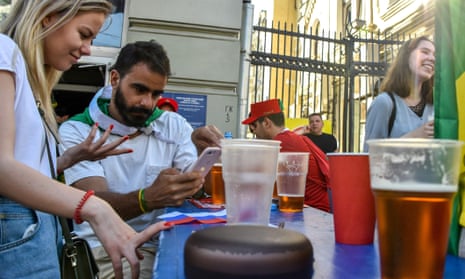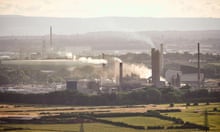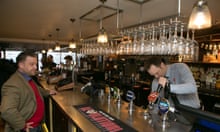The UK’s biggest wholesaler has begun rationing beer, cider and soft drinks as rising demand amid the heatwave and England’s World Cup campaign comes up against a shortage of food-grade carbon dioxide gas (CO2) which is hitting supplies.
Booker, which supplies thousands of convenience stores including the Londis, Budgens and Premier chains, as well as restaurant chains including Wagamama and Carluccio’s, is limiting beer and soft drinks purchases to 10 cases per customer and cider to five cases.
A spokesperson for the wholesaler, which was recently bought by Tesco, said: “Due to the international shortage of CO2, we are experiencing some supply issues on soft drinks and beer.
“We are currently working hard with our suppliers to minimise the impact for our customers and to optimise availability with the stock that is available. Therefore, we cannot comment further at this stage.”
The rationing is the latest sign of shortages caused by high summer demand for fizzy drinks and beer, coupled with maintenance shutdowns at ammonia and bioethanol plants across Europe, which are the key sources of CO2.
Suppliers of chicken, pork and bagged salad have also been affected, while Ocado and Morrisons home deliveries of frozen food have been hit because of a shortage of dry ice, another form of CO2.
Supplies of Heineken’s John Smith’s Extra Smooth and Amstel kegs have already been hit. The brewer said: “Like many other businesses in the food and drinks industry, we are affected by this shortage.
“We continue to work hard to resolve this issue as quickly as possible within our European supply base, and are working with customers to minimise disruption to their business.”
Coca-Cola has also said that it has “temporarily paused” some production because of the shortage of gas.
Retailers said they were also seeing some shortages of supplies of Pepsi and had expected difficulties with other beverages supplied by Britvic including 7Up, Tango and Mountain Dew by next week.
Brigid Simmonds, chief executive of the British Beer and Pub Association, said: “The shortfall in the availability of CO2 across Europe continues to impact beer producers in the UK, as well as the farming and food manufacturing sectors.
“We have recommended our members to continue to liaise with their providers directly where they have concerns over supply, but are monitoring the situation carefully.
“We continue to engage with the government on the issue and call for their assistance; such as increasing storage capacity for CO2 in the UK, to ensure this does not happen again.”
Poultry and pork producers, who use CO2 in the slaughtering process, have been among the worst affected. Production at Scotland’s largest pig abattoir was expected to cease on Tuesday afternoon, according to trade journal the Grocer, and industry sources said at least two more UK pork processing plants were close to running out of CO2.
Supplies of chicken are continuing but have slowed as producers, including the UK’s biggest poultry supplier 2 Sisters, switch to using electrical water baths to stun birds ahead of slaughter.
Richard Griffiths, head of the The British Poultry Council, said: “We are keeping going at the moment with a slightly different way of doing things.”
Retailers said supplies were being maintained but that a large amount of chicken available in shops now had only a two-day shelf life rather than the usual week, because the production process has been slowed down.









